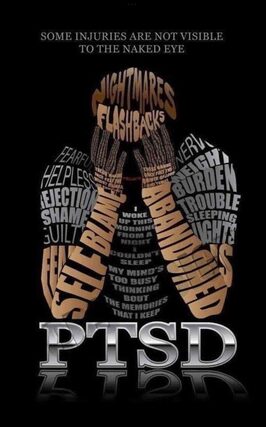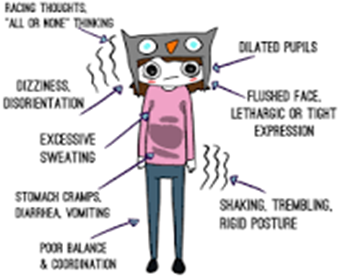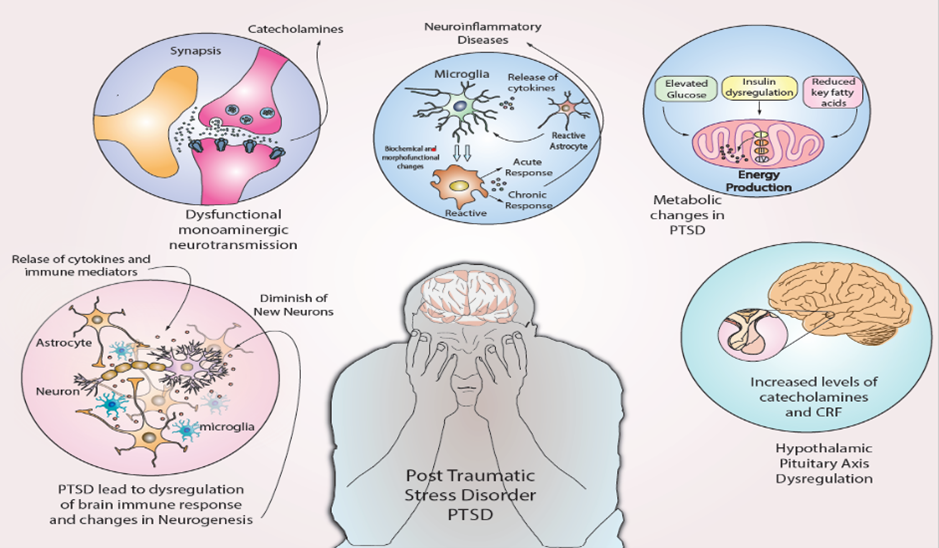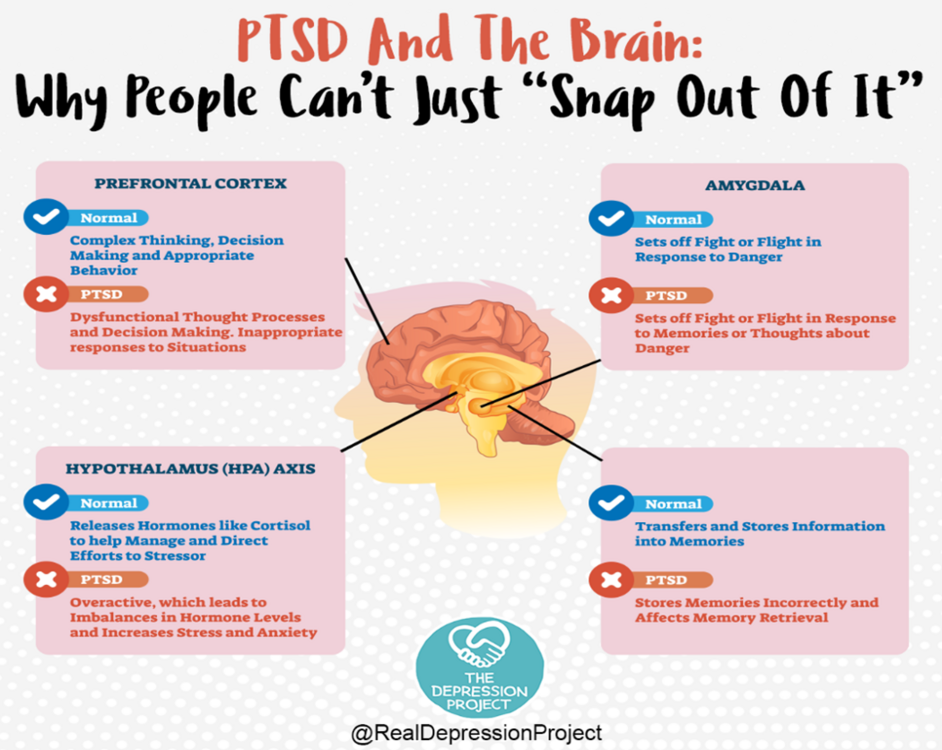
Coping with PTSD / CPTSD: Understanding and living with Post-Traumatic Stress
The information in this post is not meant to be comprehensive, only to give basic information on this disabling illness and to provide resources to seek more information or help.
Post-Traumatic Stress Disorder (PTSD) and Complex Post Traumatic Stress Disorder (CPTSD) are mental health conditions that can develop in individuals who have experienced a traumatic event or events. Traumas can encompass a wide range of experiences such as combat, natural disasters, childhood neglect, childhood or adult physical or sexual assault, accidents, or witnessing a disturbing event. Not everyone who experiences trauma develops (C)PTSD, but for those of us who do, it significantly impacts our daily life and well-being, both asleep and awake.
Symptoms of (C)PTSD can be grouped into several categories and can vary in intensity and duration from person to person as no two peoples’ experiences are the same, nor are our responses. The symptoms typically persist for months or years prior to diagnosis and can be divided into groups.
Intrusive Thoughts
Intrusive thoughts are unwelcome, involuntary thoughts, images, or unpleasant ideas that range from annoying to terrifying. They cause much distress and are difficult to impossible to manage or eliminate. Catastrophizing often accompanies intrusive thoughts.

Avoidance and Numbing
Some of us living with (C)PTSD may go to great lengths to avoid reminders of the traumatic event, including places, people, conversations, foods, or activities that trigger distressing memories. We also often avoid crowds of people, bright lights, and noise as they are overwhelming stimuli. This can lead to emotional numbness, detachment, and a loss of interest in previously enjoyed activities.
Negative Changes in Thinking and Mood
(C)PTSD can lead to persistent negative thoughts about oneself or the world, as well as distorted beliefs, guilt, and a sense of isolation. This group of symptoms may also include difficulty concentrating, memory problems, and an overall negative emotional state.
Arousal and Reactivity
Those living with (C)PTSD may become easily startled, experience heightened anxiety, irritability, have trouble sleeping, and engage in self-destructive behaviors like reckless driving, or self-medicate through substance abuse. Every person who has had or who lives with (C)PTSD, experiences it differently.

Insomnia / Sleep disturbance / Nightmares
People with (C)PTSD experience varying severities of insomnia and nightmares – sleep rarely is restorative or restful for us as our symptoms don’t rest. We have vivid, terrifying, and disturbing nightmares and often lash out physically in our sleep to defend ourselves from what we are experiencing in these nightmares. Unlike people without (C)PTSD, waking up and “shaking off” these nightmares can be virtually impossible and they will continue to haunt our waking hours, often making us fearful to fall asleep again, no matter how exhausted we are.

Suicidal thoughts
Suicidal thoughts / ideation / impulses are a sad hallmark of (C)PTSD. It can seem like the only way to escape the unrelenting symptoms, the only solution. Fortunately, societal and medical knowledge of this has grown and there are crisis resources available. Links to some of these are provided at the end of this post.
Dissociation / Depersonalization / Derealization
Depersonalization is where you have the feeling of being outside yourself and observing your actions, feelings or thoughts from a distance. Derealization is where you feel the world is unreal – almost like you’re watching a movie. People and things around you may seem "lifeless" or "foggy". These things are not readily apparent to observers such as family, friends, medical providers, or the general public. Observers may think the person is being standoffish, rude, disrespectful, withdrawn, or overly quiet. The person experiencing the symptoms may feel too ashamed to verbalize what they’re experiencing for fear of rejection or shaming, and instead isolate themselves.

(C)PTSD causes physical changes to our brains, further complicating our ability to “overcome” the symptoms. For this reason, (C)PTSD is now known to be a brain injury, verified through research, and scanning of the brain by Functional Magnetic Resonance Imaging (fMRI). Scholarly articles about this can be readily found on the internet.

Coping strategies for some of us living with (C)PTSD:
Seek Professional Help
- If you or someone you know is experiencing symptoms of (C)PTSD, it is essential to reach out to a mental health professional who is trauma informed. Trauma counseling is a specialty field and not every counselor, therapist, or psychologist has this specialized education.
- Psychotherapeutic treatment options are evolving and may include talk therapy, Cognitive Behavioral Therapy (CBT), Cognitive Processing Therapy (CPT), Eye Movement Desensitization and Reprocessing (EMDR), Dialectical Behaviour Therapy (DBT), and in some cases, medication.
- Social Support could be spending time with friends and family for emotional support. Sharing your feelings and experiences with people you trust might help alleviate the isolation that often accompanies (C)PTSD.
- Prioritize self-care activities. Regular exercise (getting up and moving) doesn’t mean you have to run a marathon. Being mindful of eating healthy food choices can make a difference in mood and energy. Making sure you get adequate sleep - easier said than done as sleep disturbance and insomnia are key features of (C)PTSD - to help manage some of the symptoms. These can have a positive impact on your overall well-being.
- Practice relaxation and stress-reduction techniques like deep breathing, meditation, yoga, or progressive muscle relaxation to help manage anxiety and arousal symptoms.
- Avoid using alcohol, caffeine, or drugs to cope with (C)PTSD as they can lead to further problems. It's important to seek healthier coping methods.
- Maintaining a regular daily routine can provide structure and predictability for some, which can help reduce anxiety and provide a sense of stability.
- Educate yourself so you have a better understanding of (C)PTSD and its symptoms. Knowledge can be empowering. Knowing what to expect and how to manage it can make the condition feel less overwhelming.
-Joining support groups for those of us living with (C)PTSD can offer a sense of community and understanding. Connecting with others who have experienced similar trauma can be comforting and helpful. This can be accomplished online if you aren’t comfortable being in a group setting or if a group setting isn’t available to you.
It's essential to remember that recovery from (C)PTSD is a journey and it is different for all of us. It takes time to heal and sometimes we never completely recover, but we learn to better manage the symptoms.
It can be extremely difficult for some of us to talk about how we are feeling or if we are coping or not. If someone shares with you that they have (C)PTSD, believe them. Most people do not go around pretending to have mental health disorders if they do not. Take it as a compliment that we trusted you by sharing.
Different strategies work for different people, so it's crucial to find what works best for you with the guidance of a mental health professional. If you or someone you know is struggling with (C)PTSD, don't hesitate to seek help.
Crisis hotline for the United States: 988
Crisis hotline for B.C., Canada: 800 - 784 – 2433
Crisis hotline for B.C., Canada: 310 – 6789 (no area code needed for this number)
A guide to supporting those of us living with PTSD
Being a support to someone living with Post-Traumatic Stress Disorder (PTSD) or Complex Post Traumatic Stress Disorder (CPTSD) can make a significant difference in our recovery and overall well-being. Here are some ways you can provide support to us who are living with (C)PTSD:
- Learn about (C)PTSD, its symptoms, and treatment options. Understanding the condition will help you empathize with us, be less confused or upset by our behaviours, and you will be able to offer more effective support.
- We really do appreciate your patience and understanding, even if we don’t always verbalize it. (C)PTSD is be a long and challenging journey. Be patient, non-judgmental, and empathetic. Avoid pushing us to talk about our trauma if we are not ready and consider that you may not be ready to hear about it, despite your best intentions. Someone with (C)PTSD will be reliving the experience you are asking them to tell you about. To their brain and body, it is not just a memory.
- If someone with (C)PTSD wants to talk, be a good listener. Let us share our thoughts and feelings at our own pace. Avoid offering unsolicited advice or solutions. The trauma(s) that caused (C)PTSD were harsh, ugly, and brutal events for us to experience and will not be easy for anyone to hear.
- Help us to feel safe and supported. This may involve creating a calm and predictable environment, avoiding triggers, and the verbal reassurance “You are safe here and now.”
- Encourage us to seek professional treatment if we have not or are not currently. Offering to help us find a suitable trauma informed therapist or psychiatrist if needed can be extremely helpful as at times when we are not motivated or in the right space, that can be an impossible task.
- If you are comfortable, you could offer to accompany us to therapy or medical appointments. This can provide emotional support and make the process less daunting for us.
- Most of us have triggers. These can be specific situations, places, or sounds that remind us of the traumatic event(s). Being mindful of these triggers and try to minimize exposure when possible.
- Respect our boundaries and personal space. Don't pressure us to participate in activities or social events if we are not ready.
- Offer us practical support such as helping with tasks like cooking, cleaning, or running errands when needed. Practical assistance can alleviate stress and allow us to focus on our recovery.
- Be aware of signs of crisis or suicidal thoughts. If you believe we are in immediate danger, seek professional help or contact a crisis hotline.
- Something you could do that could be really helpful for some of us is to find local or online support groups for individuals with (C)PTSD, that we can join. Sharing experiences with others who understand can be incredibly beneficial.
- Check in on us and our well-being but respect our need for space if we don't want to talk. Simply knowing that someone cares can be comforting.
- Please be flexible and prepared for our needs to change. What is helpful today may not be the same in the future, so be flexible in your support.
Remember that supporting those of us with (C)PTSD can be emotionally challenging, so it's essential to take care of your own well-being. Encourage us to build a support network, including mental health professionals, friends, and family members. By offering your understanding and support, you can play a crucial role in our healing process.
(C)PTSD learning resources:
“The Body Keeps the Score” – Bessel Van der Kolk
